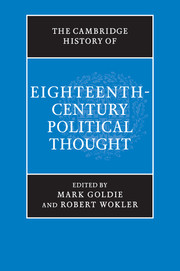Book contents
- Frontmatter
- Introduction
- Part I The ancien régime and its critics
- Part II The new light of reason
- 5 The comparative study of regimes and societies
- 6 Encyclopedias and the diffusion of knowledge
- 7 Optimism, progress, and philosophical history
- 8 Naturalism, anthropology, and culture
- Part III Natural jurisprudence and the science of legislation
- Part IV Commerce, luxury, and political economy
- Part V The promotion of public happiness
- Part VI The Enlightenment and revolution
- Biographies
- Bibliography
- Index
- References
5 - The comparative study of regimes and societies
from Part II - The new light of reason
Published online by Cambridge University Press: 28 March 2008
- Frontmatter
- Introduction
- Part I The ancien régime and its critics
- Part II The new light of reason
- 5 The comparative study of regimes and societies
- 6 Encyclopedias and the diffusion of knowledge
- 7 Optimism, progress, and philosophical history
- 8 Naturalism, anthropology, and culture
- Part III Natural jurisprudence and the science of legislation
- Part IV Commerce, luxury, and political economy
- Part V The promotion of public happiness
- Part VI The Enlightenment and revolution
- Biographies
- Bibliography
- Index
- References
Summary
The ambiguities and resources of comparative method
Comparison and contrast were used by eighteenth-century European thinkers to characterise their nations and continent, as well as their historical epoch. This was done by distinguishing the arrangements of each nation from its neighbours’, by contrasting European regimes, societies, economies, cultures, and religions with those elsewhere in the world, and by juxtaposing their own time with periods preceding it. This comparative mode of analysis was deployed in conflicts between the champions and enemies of Enlightenment, in the sharp disagreements separating defenders of absolutism from those opposed to it, and in disputes about established churches and their theologies. Although political theory was often conducted through comparison and contrast between European regimes, the application of the method to the rest of the world was no less significant. Some modern interpreters hold that European thinkers assumed their continent’s superiority, and thus that ‘Enlightenment’ went hand in hand with imperial subjugation of non-Europeans. Others, on the contrary, say that xenophilia, étrangisme, and the conviction of European inferiority, decline, and corruption prevailed among intellectuals (Baudet 1988, pp. 50–1).
This chapter addresses some of the numerous and complex ways in which European writers used comparative discourse. It examines the extent to which key concepts in this discourse were shaped by theorists’ preferences and their positions on domestic controversies within their respective nations, as well as on issues during conflicts among European states within their own continent and in overseas competition for colonies. It asks whether there was any consensus about the superiority of Europeans over the rest of world, or about the legitimacy of European conquests, colonisation, and commerce, including the slave trade.
- Type
- Chapter
- Information
- The Cambridge History of Eighteenth-Century Political Thought , pp. 145 - 171Publisher: Cambridge University PressPrint publication year: 2006
References
- 1
- Cited by



